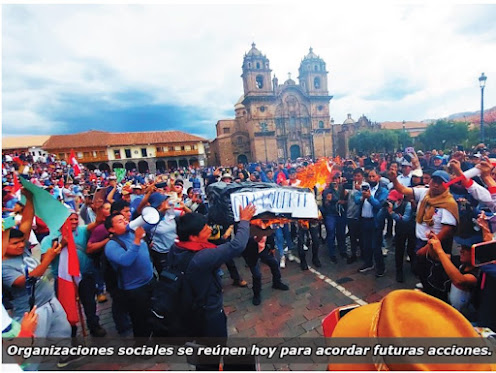Peru's government will prosecute 'online terrorism' with Fujimori era rule that violates freedom of expression (Wayka [Spanish] - 2/8/2023)
Five years ago, Fuerza Popular (Popular Force), a far-right party led by the person under investigation for alleged money laundering, Keiko Fujimori, promoted an initiative to modify Peru's Criminal Code referring to the crime of apology for terrorism to "end the marches and meetings of the Movadef [Movement for Amnesty and Fundamental Rights]”, but above all to persecute those who carry out 'online terrorism' on social networks. Today this regulatory change, which affects freedom of expression and violates international standards, serves the authoritarian and military regime of Dina Boluarte to persecute Internet users.
Jair Sarmiento
Recently, the Judiciary issued the first sentence in the country for apology for terrorism on social networks. The reason? A publication on his Facebook account where, according to the Prosecutor's Office and the Public Prosecutor's Office Specialized in terrorist crimes, it was "content that exalts, exalts and justifies the leader of Sendero Luminoso, Abimael Guzmán." However, if one scrolls and reviews the profile of the convicted person, one can easily tell that he was an open supporter of Fujimori, rejected terrorism, and made publications stigmatizing Pedro Castillo and other leftist politicians. So, what happened here? What awaits users of social networks in a context where the term 'terruqueo'* is used indiscriminately?
* [The term 'terruqueo' is derived from the word terruco, or "terrorist" in English, a neologism which originated from individuals in Ayacucho describing Shining Path guerrillas during the internal conflict in Peru. Historian Carlos Aguire said that the -uco replaced the ending of the word terrorista by Quechua speakers since they typically terminate words with -uco. Since the 1980s, the word terruco has been used, at times carelessly, by right-wing politicians in Peru to target left-wing, progressive, and indigenous groups, with this often-baseless attack being called a terruqueo.]
To begin, we must go back to June 15, 2017, when the Plenary of the Congress of the Republic approved, with seventy-one votes in favor, the modification of the Penal Code on the crime of apology for terrorism. The proposal brought together legislative initiatives from then congressmen Octavio Salazar (FP), Carlos Tubino (FP), Luciana León (CPA), Edmundo Del Águila (AP) and Marco Miyashiro (FP).
In that vote, Congress Members from the Frente Amplio (Broad Front) Marisa Glave, María Elena Foronda, Rogelio Tucto, Marco Arana, Indira Huilca, Édgar Ochoa and Alberto Quintanilla, among others, expressed their concern that this change could be used to persecute social marches and popular demonstrations. in defense of their rights.
The regulation (Law No. 30610), which was signed and promulgated by former President Pedro Pablo Kuczynski, modified Article 316 and incorporated Article 316-A into the Penal Code. With this, the sentences were increased to between eight and 15 years in prison for apology.
In this sense, this new paragraph was included: "If the exaltation, justification or exaltation is propagated through objects, books, writings, visual or audio images, or is done through printing, radio broadcasting or other means of social communication or through the use of information or communication technologies for the crime of terrorism by the person who has been convicted by final judgment as the perpetrator or participant in acts of terrorism…”.
Today this modification is used by the Ministry of the Interior of the Dina Boluarte regime to persecute any user who fits this crime. They even opened an email to receive virtual complaints from citizens.
In this regard, the National Human Rights Coordinator (CNDDHH) rejected this measure and stated that the current regulations on apology for terrorism affect freedom of expression and violate international standards.
Together with other organizations such as Amnesty International, they pointed out that this "virtual platform can be exploited as a tool for harassing and criminalizing in the current context of social political crisis in which social protests that are strongly repressed and positions critical of the Government come loaded with “terruqueo”.
In addition, they specified that, on repeated occasions, the "indications" of this crime sustained by the authorities "have been nothing more than statements based on erroneous interpretations." Finally, they stressed that this is a dangerous scenario for human rights.
For its part, the NGO Hiperderecho recalled that the Inter-American Commission on Human Rights (IACHR), through the report Standards for a Free, Open and Inclusive Internet, clarifies that "the criminalization or aggravation of penalties in cases of speech simply for having been disseminated through the Internet.
They also cited the Joint Declaration of the Special Rapporteurships for Freedom of Expression of 2018, which maintains that "States should refrain from adopting unnecessary and/or disproportionate laws criminalizing or imposing harsher penalties on online expression than its offline equivalent."
The UN criticized the legislation to support terrorism in Peru
In September 2010, Martin Scheinin, UN Special Rapporteur on the promotion and protection of human rights and fundamental freedoms in the fight against terrorism, visited Peru and produced a report where he examined the measures taken by Peru to help victims of terrorist crimes and human rights violations committed by the State during the internal armed conflict between 1980 and 2000.
In addition, he analyzed the current legislative framework for the fight against terrorism and its application in practice. In that year, he made clear his concern about the definition of terrorism contained in Peruvian criminal law.
“The wording of Article 316 of the Penal Code, if applied literally, carries serious risks of leading to violations of Article 19 of the International Covenant on Civil and Political Rights,” it noted in the report.
In addition, he commented on his concern about the stigmatization carried out by politicians against human rights defenders and social movements.
Finally, the report states that to maintain a democratic society "the State has the obligation to ensure that channels are available for the peaceful expression of different, even radical, political ideologies."
Tags: #Peru #OnlineTerrorism #Terruqueo #FreedomOfExpression





Comments
Post a Comment